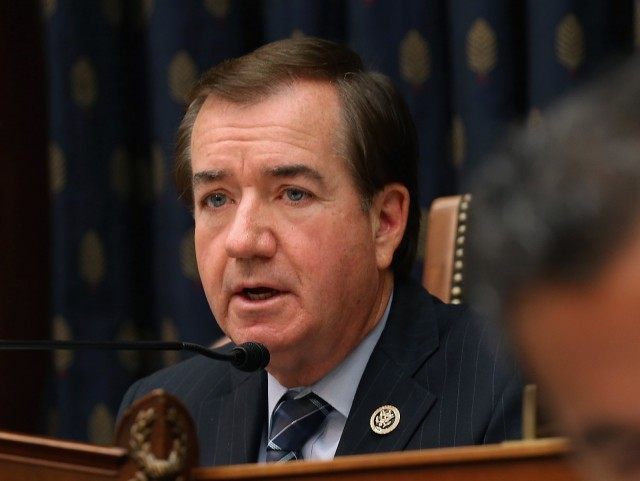On Thursday, House Foreign Affairs Committee Chairman Rep. Ed Royce (R-CA) questioned two leading figures involved with monitoring Iran’s compliance with the Joint Comprehensive Plan of Action (JCPOA), or the Iran deal.
Royce questioned both men about the national security implications of Iran’s growing hegemony in the region following “implementation day” of the now-historic deal.
Royce noted the Obama administration’s continuous appeasement of the world’s foremost sponsor of terrorism, “to protect this deal at all costs.”
He asked Stephen D. Mull, the lead coordinator of Iran Nuclear Implementation at the U.S. Department of State, and John Smith, the acting director of the Office of Foreign Assets Control with the U.S. Department of Treasury, about the White House’s decision to lift an Interpol red notice against Iran’s privately-owned Mahan Airlines’ chief executive as part of the recent prisoner swap deal. He also asked them to clarify what specific national security interests justify a waiver for the Iran visa program, which would have made it more difficult for individuals who travel to nations like Iran, Iraq and Syria to acquire business visas to the United States.
Mahan Air is openly recognized as the IRGC’s primary form of transportation for ferrying both weapons and Iranian military personnel into Syria to aid the Syrian regime. It is also the primary flight for IRGC-Quds force Commander Qasem Soleimani, who recently flew to Moscow to discuss a counter-offensive to salvage the Syrian regime. Royce pointed out that after implementation, “these flights to Syria actually increased,” noting that if the administration was “serious” about the national security implications, immediate action would be taken against institutions that transact with Mahan Airlines by slapping heavy fines upon them.
Smith responded saying that State Department has been “very engaged” on the ground with regard to Mahan Air and that bureaucrats “have continued to designate those entities that continue to support” the airliner in addition to “going after the finances where we can.” Royce rebutted saying mere “jawboning” is not enough. “In the meantime, they are expanding their operations. And in the meantime, they are flying into Syrian on a regular basis …. As that support comes in, it has very dire consequences in Syria. And what I don’t see is the pushback.”
Royce then questioned the justification behind “going around the law that the president signed simply because the Iranians protested” the visa waiver program. Smith replied, “with regard to the visa waiver program, I’d have to defer to my colleagues at the State Department.”
At one point during the hearing, Royce said “It sounds harsh, but it sure looks as if the Supreme Leader [Ayatollah Khamenei] effectively vetoed the bill that had been passed inside.” Mull then attempted to defend the move, suggesting that the administration found it necessary to amend the legislation for the waiver program in order to ensure that “important missions” could be carried out, including that IAEA inspectors and journalists be able to come and go between Iran to verify that Iran is keeping its commitments. Royce intervened clarifying that was not their objection.
“What the administration should have told Iran is stop supporting terrorism and this won’t be a problem.” He pointed out that the way Congress wrote the bill indicated “it is state sponsors of terrorism. But the problem we are having is that Iran has not changed its course. Iran is still supporting Hezbollah to the helm, still saying they are going to transfer 100,000 GPS guidance systems held by Hezbollah — provided by Iran by the way — to better target cities inside Israel. But instead of doing that, instead of taking that stance, you created an exception. The administration created an exception. And again, the president signed the law.”
Iranian President Hassan Rouhani recently went on a European tour in an attempt to deepen economic ties with several nations there. Rep. Eliot Engel (D-NY) asked the men whether Europe will enforce snap-back sanctions if Iran cheats, and even forgo some of their economic ventures despite the lucrativeness of the new deals.
“I fully expect that Europe is going to continue to be a committed partner with us and our sanctions programs,” Smith said in response. In defense of Europe, he pointed out that several European countries had “already sacrificed many of those deals the first time around and cut those deals off …. So I fully expect that Europe will continue to comply with the deal that we’ve struck.”
Rep. Ileana Ros-Lehtinen (R-FL) presented another point of concern, noting North Korea’s collaboration with Iran on nuclear issues. She asked the men if Iran acquiring knowledge consistent with nuclear parameters from the Hermit Kingdom, without having the actual materials, would be considered a violation of Iran’s agreement in the JCPOA.
“North Korea is not specifically mentioned in any of the agreements,” Mull said. “However, in the agreement, Iran committed to refrain from all research aimed at developing a nuclear weapon. If we had reason to believe they were not complying with that, we have all the full range of opportunities to respond.”
Asked if they could confirm if Iranian scientists were present in North Korea for its recent nuclear detonation on January 6, Mull said “I cannot.”
Photo: File
Follow Adelle Nazarian on Twitter @AdelleNaz.

COMMENTS
Please let us know if you're having issues with commenting.